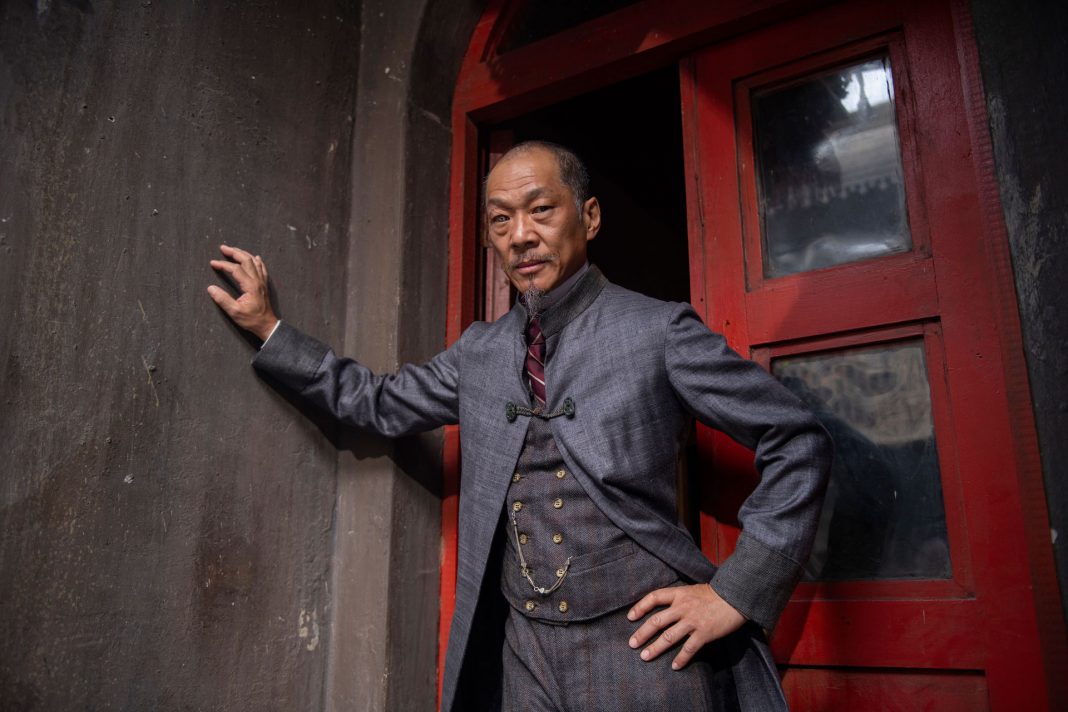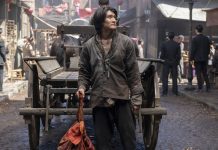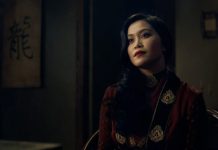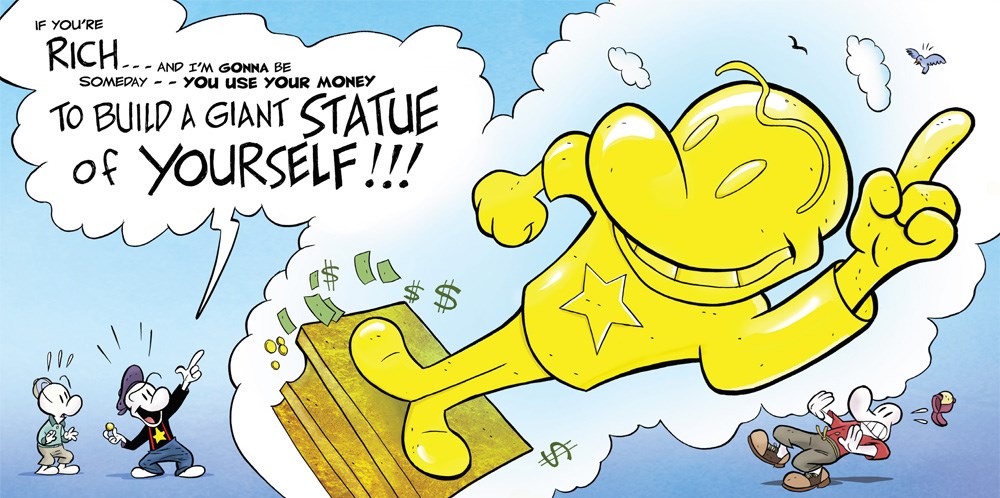Here we are, on the eve of the Warrior season two finale. Despite its uncertain future, this Sophomore Season has shown that the Cinemax series can really dig in and explore its complex storylines, historical references, and large cast of characters. The Beat spoke with actor Perry Yung, who plays Father Jun, about Warrior season two and the way that show diversifies its portrayal of Asian American characters.
Born and raised in Oakland, Perry Yung lived down the street from Bruce Lee‘s kung fu studio, where he taught in 1964. Lee later went on to write the treatment that would inspire Warrior. So, yeah, Yung grew up down the street from a legend. He attributes his first entry-level experience into understanding the gangs of Chinatown to the Golden Dragon massacre, he refers to it as “the big one that started all the movies and stereotypes,” a shooting attack that took place in 1977 between the Joe Boys Gang and the Wah Ching gang.
“Us being in Oakland, it was like, ‘Wow, it’s intense over there across the bridge.’ We were just kids. We’re just people in Chinatown, we have cliques, we don’t have gangs like that. That’s so intense.” He continued, “And then I started to do more research over the years because I just became fascinated with Chinese American history. And I saw that the Tong Wars were basically a struggle over running Chinatown and who gets to own the money flow.”
“But at the same time, I saw how that was a small part of who the Tongs were. Tongs are basically a benevolent association to help members from the same clan or village in China. So, these were not nefarious groups, you know like the Mafia, but there were a few that were like Mafia type, that dealt with the underground and illegal activities. I even had to have a talk with Steven Soderbergh, when I worked on The Knick, like Tong doesn’t mean bad. A Tong, in itself, is a good thing. There are some bad Tongs. I understood that, and I think that the writers definitely understood that.”
At the mention of Bruce Lee, Yung added, “You know, Bruce, when he first wrote this treatment, he understood at that time — I mean we’re talking about the early 1970’s — that there was an explosion of martial arts in Chinatown and all this was very sort of new and exotic to that culture. And the funny thing is not much has changed in 40 years and I think a lot of people still think martial arts in Chinatown is somewhat exotic. But, I think, understanding that Shannon Lee was a part of this — it was going to be a great thing. And that Justin Lin was a part of this is, how could it not be a great Asian American voice?”
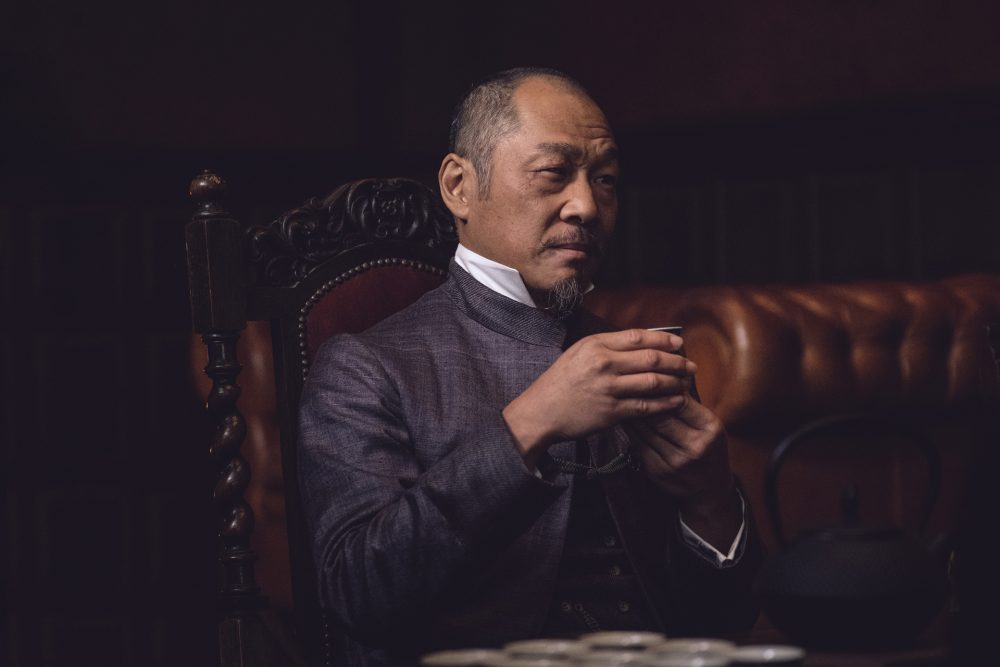
And after reading the script, he said, “This is a playground for us to actually alleviate a lot of stereotypes because we actually speak English. There’s humor, there’s drama. There’s interpersonal relationships that expanded the dynamic personalities of Asian Americans and Chinese Americans. I mean, it’s a great thing. I think kung fu and The Tong Wars is sort of a pulpy vehicle for this show. For the Asian actors to, sort of, flex. They get to flex their acting chops as actors, which up until this point, we didn’t really have that same time on camera. I mean this show has leads; the first four cast members are Asian American or Asian, and two are mix — Hapa!”
Perry Yung’s Father Jun is the leader of the fictional Hop Wei Tong, a Tong made up of young members, who don the Hop Wei uniform of slick, black suits. His heir, Young Jun (Jason Tobin) is an American-Born Chinese (we sometimes refer to ourselves as ABCs). Facing off against these Western suits and Western hair cuts, are the Long Zii Tong. Formerly run by Long Zii (Henry Yuk) and now helmed by Mai Ling (Dianne Doan), the Long Zii are far more traditional. Man of their members wear traditional Chinese clothing and keep their braided queues, a common hairstyle worn during the Qing dynasty of China.
The physical differences are only one thing that set the two Tongs apart from one another, but it is the most noticeable. “I thought [that] was great because it works on a level of culture, and immigration, and assimilation. So we have the Hop Wei who’ve been there longer, which is sort of like the Joe Boys, when talking about the American-born [members] and Yong Jun being American-born — he’s ABC.”
“And the Long Zii are more traditional and more mysterious in some ways. We don’t hear their interpersonal dialogue between buddies as much as we do with the Hop Wei. It’s about being an American, which I thought was a great statement to say, look what happens when they’re in America longer. The culture shifts, there are different people in Chinatown, there are different levels of assimilation.”
Those suits are so reminiscent of John Woo and his brand of Hong Kong cinema. Perry Yung references the early 90’s when Asians started to change in American pop culture. “Up until that time, there weren’t a lot of Asians seen in culture, and then like when John Woo came around all the younger people, who were non-Chinese were like, ‘Wow, Asian guys are really cool!'” He compared Woo’s films against the painful stereotypes of characters like Long Duk Dong in Sixteen Candles. “That’s a shift in the culture, which was really what’s interesting at the time. Thanks to John Woo and Chow Yun Fat.”
Season Two of Warrior also saw Father Jun taking on a more active role not only in helping to defend Chinatown during the massacre we saw take place in last week’s Episode 9 “Enter the Dragon,” but in preparing his Young Jun for his eventual ascendancy. Yung talked about his excitement to play the part of the father to Young Jun. “This is a special thing for me to be the father on TV because I feel like up until Fresh Off the Boat, there was no Chinese father and son duo ever portrayed on TV. I think, that we need to take Father Jun seriously, because Asian men are always emasculated in this country. And the only people that have power as Asian men are usually kung fu masters. Other than that, on TV we’re like the engineer, or the doctor, or the sidekick.”
As the leader of the Hop Wei, Father Jun acts as their figurehead, but he also must spend his time teaching his hot-headed son the nuances of rulership. Not only must he learn to navigate the ways of Chinatown relations, but also navigate his relationships with the politics of San Francisco and the Chinese back in the homeland. Yung explained that he often would downplay stricter lines to emphasize the fact that Father Jun is trying to use disciplining moments as teaching moments.
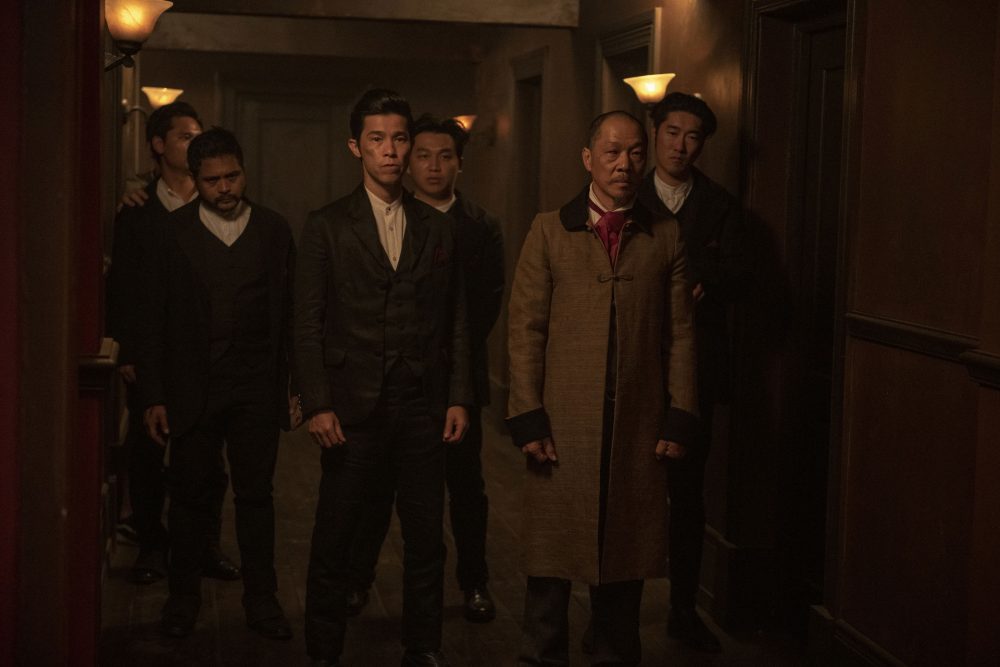
“I think that by the time we get to season two, we find that that the writers enjoyed Father Jun’s relationship with his son and it has softened him. So, that was a great moment for me to say thank you. Then Father Jun can actually be more nuanced in how he acts as a father, not just as the Tong leader, who demands a lot from his son, which is kind of a trope but it’s also true in real life, where you have an Asian father who wants the [eldest] son to take over the business.”
“And I think that exists in real life for a lot of Chinese Americans, especially of one or two generations. For this role, I think audiences have to see a Chinese American that is a firm strong character in how he guides his son and it really does come from love at the end.” Separated by a generation, Father Jun is a revolutionary and a soldier, who lost his eye fighting the British during the Opium Wars in a moment that can only be described as badass (he killed the guy who stabbed him in the eye by taking the sword out of his eye and jamming down the other guy’s throat).
His son was raised on the streets of Chinatown, he is brash and stubborn, but he is inexperienced. In Season One, during the standalone episode “The Blood and the Shit,” Young Jun admits that he’s never been to China and he feels disillusioned by his experiences. “The script is actually telling the audience that there’s a problem with this relationship between the father and son,” says Yung. “There’s a lot of tension here, and the son can’t take the tension anymore. So the son can finally step up and break out of that and make his own choices.”
Yung describes Father Jun as having a “Malcolm X intensity” to him. “He got here and saw how the Chinese struggled in America, and how they were victims of lynchings and riots and burnt down Chinatowns, and in order for us to rise and fight this, I need to be stronger. I need a strong son. And how can I make sure that my son is going to inherit this responsibility? I mean, we never say it’s really all about money. No, it’s really about saving our people against violence.”
And after the cataclysmic and horrifying events of “Enter the Dragon,” the future of Chinatown and the Tongs feels uncertain. Will Father Jun take back the Hop Wei? Will Young Jun step up to the plate and take retribution? Will he ally with Mai Ling?
Following the finale, according to Vanity Fair, you should be able to stream Warrior on HBO Max. The season finale of Warrior airs tomorrow, Friday, December 4th at 10pm EST/11pm PST exclusively on Cinemax.


